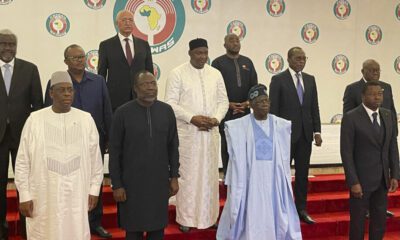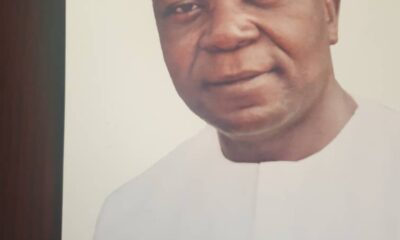Legal Issues
Behavioral Health in Focus: A Psychologist’s Take on Biden’s Debate Challenges Beyond Akinyemi’s View -By John Egbeazien Oshodi
For an elder statesman like President Biden, who is 81, battling a cold while managing the immense pressure of a national debate can exacerbate stress and anxiety. This combination likely contributed to moments where he lost his train of thought or had awkward pauses, impacting his overall debate performance.

In this write-up, let’s delve into the health challenges President Biden could have appeared to encounter during the presidential debate. The exploration extends beyond the observations of former Foreign Minister Bolaji Akinyemi. I am examining the potential implications of Biden’s apparent cold. Consider how this common ailment might have contributed to heightened anxiety and energy depletion, factors that could significantly affect performance in such a high-pressure environment.
In the Vanguard Newspaper of June 28, 2024, Miftaudeen Raji reported in an article titled “Biden lost US presidential debate; I feel sorry for him —Bolaji Akinyemi’s analysis provides both compassionate views and some critical insights into President Biden’s performance during the recent U.S. presidential debate. However, it may not fully recognize the intricate interplay of health issues and their psychological impact, particularly in the context of high-stakes political engagements.
However, while Akinyemi’s commentary is insightful, it may overlook additional crucial factors affecting Biden’s performance. According to The Hill, an American top political media, President Biden was battling a cold during the debate, which affected his voice, rendering it hoarse, and led to his notably quiet speech and slow start. Biden began coughing the moment he started speaking and, during other moments, he lost his train of thought, had awkward pauses, or jumbled his sentences. These symptoms—common signs of a cold—severely impacted his ability to perform at his best.
In the context of the presidential debate, “behavioral health” ostensibly refers to the complex interplay between President Biden’s physical symptoms and their psychological effects, which seemingly influenced his debate performance. Apparently suffering from a cold, Biden faced not only typical respiratory symptoms but also systemic impacts that could disrupt cognitive functions, such as concentration and memory, and impair speech clarity through coughing and hoarseness. These physical ailments likely heightened his anxiety, a natural response to managing illness while under the intense scrutiny of a national debate. The supposed energy depletion associated with a cold would have made it challenging for Biden to appear dynamic and responsive, crucial traits for a strong debate presence. The overall sensation of feeling unwell could have compounded these issues, detracting from his ability to engage fully and effectively, thus impacting his behavioral health and, subsequently, his performance during the debate.
A cold, while common, can have serious implications for someone in a high-stakes situation. Symptoms such as coughing, a hoarse voice, and general malaise can make it difficult to project confidence and maintain focus. These physical symptoms could exacerbate psychological stress, leading to increased anxiety, which can interfere with cognitive functions, making it harder to think clearly and respond effectively under pressure.
Energy depletion is another significant factor. When dealing with an illness, the body requires more energy to fight off infection, leaving less available for other activities. In the context of a debate, this energy drain can manifest as reduced stamina and a diminished ability to engage dynamically with an opponent.
For an elder statesman like President Biden, who is 81, battling a cold while managing the immense pressure of a national debate can exacerbate stress and anxiety. This combination likely contributed to moments where he lost his train of thought or had awkward pauses, impacting his overall debate performance.
President Biden and former President Trump, being the oldest major party candidates for the U.S. presidency, also bring to light the additional challenges faced by older adults in such demanding roles. Age-related physiological changes can make recovering from even minor ailments more challenging, affecting stamina and cognitive capabilities.
In light of these considerations, it’s crucial for public figures, especially those in the twilight years of their careers, to manage their health meticulously. Proactive measures could include more stringent health monitoring during campaign seasons, possibly adjusting debate schedules to allow candidates adequate rest and recovery time, and ensuring immediate medical interventions are available during physically taxing periods.
Future strategies might also benefit from incorporating a psychological support system to help candidates cope with the stress and mental strain of campaigning. Techniques like mindfulness, stress management training, and cognitive exercises tailored to enhance mental clarity could help mitigate the impact of health issues on public performance.
By broadening the discourse to include these aspects, Akinyemi and other observers can offer a more holistic view of the challenges faced by political figures, acknowledging the complex interplay between physical health, psychological resilience, and public performance. Educating the public about these dynamics not only fosters a more empathetic audience but also enhances our understanding of the human aspects behind political leadership. This approach not only enriches the breakdown but serves as a crucial reminder of the importance of health and well-being in maintaining the effectiveness and integrity of our leaders.
Now that we see how physical health can influence psychological well-being and behavioral responses, particularly in high-pressure public settings such as political debates, let’s hope for no more colds. Perhaps future debates should come with a visible cup of water, and the option to stand or sit—maybe even a cozy blanket and some chicken soup on standby before and after! Let’s make sure our leaders are as comfortable as possible while they tackle the tough questions.
Professor John Egbeazien Oshodi, born in Uromi, Edo State, Nigeria, is an American-based police and prison scientist, forensic-clinical psychologist, public policy psychologist, and legal psychologist. He’s a government advisor on forensic-clinical psychological services in the USA and the founder of the Dr. John Egbeazien Oshodi Foundation for Psychological Health. With a significant role in introducing forensic psychology to Nigeria through N.U.C. and Nasarawa State University, he’s also a former Secretary-General of the Nigeria Psychological Association. He’s taught at esteemed institutions like Florida Memorial University, Florida International University, Nova Southeastern University, and more, and is currently an online faculty member at Weldios University and Walden University. John.Oshodi@mail.waldenu.edu










